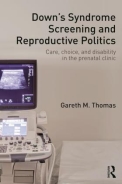
Dr. Gareth Thomas (University of Cardiff)
A lecturer in Sociology at Cardiff University (United Kingdom), and a sociologist interested in medicine, disability, stigma, health, reproduction, genetics, parenthood, and place. Dr. Thomas have conducted an ethnographic study of prenatal screening/testing for Down’s syndrome in two healthcare settings, a qualitative study of young people’s perceptions of health, place, and inequality whilst living in a post-industrial town in Wales (United Kingdom), and a qualitative study of pregnancy and parenting ‘apps’ (with Professor Deborah Lupton). Currently, he is working on submitting a research grant bid on non-invasive prenatal testing, a huge global issue – particularly in China.
1. Tuesday October 10th, 1-3pm: “Ethnography” for undergraduates (location: Room 507, Teaching Building #2 [二教]). Host: Prof. Guo Jinhua (Peking University)
Lecture name
‘Ethnography: The Importance of Being There’
Lecture information
I begin this lecture by attempting to define ‘ethnography’, highlighting how this term is complex and widely disputed. I discuss the key terms, processes, and research methods typically associated with ethnography, reflecting on longstanding debates around methodological development and empirical research. This includes outlining issues around participant observation, fieldnotes, positionality, access, ethics, and leaving the field. In what follows, I present some ‘tales from the field’, both my own and from others, to identify the many challenges of carrying out ethnographic fieldwork. Nonetheless, I highlight how ethnographic research stays closes to the complicated and mundane organisation of everyday life and, in so doing, I affirm the value of fieldwork for making sense of the social world.
2. Tuesday October 10th, 7-9pm: ‘Overseas Scholar’s Lecture’ (location: Room 201, Science Building #5 [理科五号楼]). Host: Prof. Liu Neng (Peking University)
Lecture name
Down’s Syndrome Screening and Reproductive Politics: Care, Choice, and Disability in the Prenatal Clinic

Lecture information
In the UK and beyond, Down’s syndrome screening has become a universal programme in prenatal care. But why does prenatal screening persist, particularly in light of research that highlights pregnant women’s ambivalent and problematic experiences with it? Drawing on my book detailing an ethnographic study of Down’s syndrome screening in two UK hospitals, I explore how and why we are so invested in this practice and what effects this has on those involved. Informed by theoretical approaches that privilege the mundane and micro practices, discourses, materials, and rituals of everyday life, I describe the banal world of the clinic and, in particular, the professionals contained within it who are responsible for delivering this programme. In so doing, I illustrate how Down’s syndrome screening is ‘downgraded’ and subsequently stabilised as a ‘routine’ part of a pregnancy. Further, I capture how this routinisation is deepened by a systematic, but subtle, framing of Down’s syndrome as a negative pregnancy outcome. By unpacking the complex relationships between professionals, parents, technology, policy, and clinical practice, I identify how and why screening is successfully routinised and how it is embroiled in both new and familiar debates surrounding pregnancy, ethics, choice, diagnosis, care, disability, and parenthood. I also discuss how this connects with recent debates in the UK and other countries (including China) around non-invasive prenatal testing (NIPT). This talk will likely appeal to people interested in medical sociology, medical anthropology, science and technology studies (STS), bioethics, genetics, and/or disability studies.
3. Wednesday October 11th, 6:40-8:30pm: ‘Research Tool Design’ for postgraduates (location: Room 104, Teaching Building for Literature and History [文史楼]). Host: Prof. Liu Neng (Peking University)
Lecture name
‘Doing Ethnography in Hospital Settings: Reflections on Research Design’
Lecture information
In this lecture, I will discuss my PhD research: an ethnographic study of prenatal screening for Down’s syndrome in two UK hospitals. I begin by reflecting on gaining access and NHS ethical approval by drawing on the notion of ‘preliminary field-work’ (Caine et al. 2009: 491). In what follows, I outline my field entry and how data were collected during my stay at Freymarsh, a large NHS teaching hospital in a metropolitan area, and Springtown, a privately-funded fertility clinic in an affluent area. I reflect on how I was positioned by professionals during fieldwork, that is, my identity-work both performed and ascribed. I subsequently describe my data analysis strategy based on Clarke’s (2003: 571) ‘situational analyses’, an approach holding a clear affiliation with the notion of grounded theory. Finally, I flesh out the underlying problems of my research and, in grander terms, the ethnographic craft. In so doing, I recognise self-conscious reflexivity – urging us to think critically about roles and relationships, about ethics and responsibilities – as a fundamental feature of ethnography.